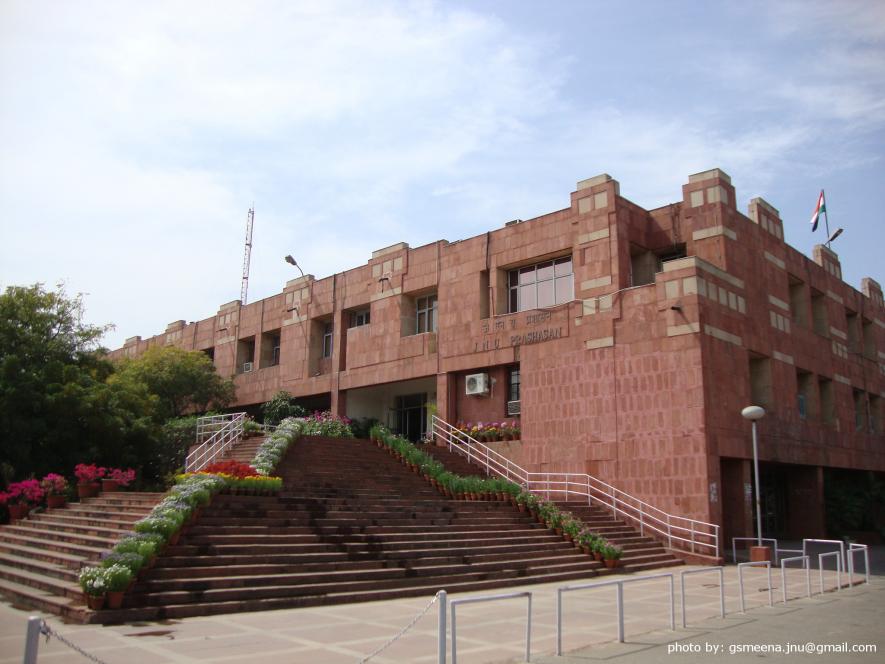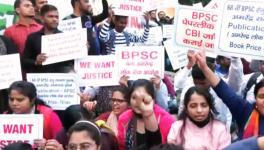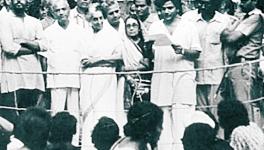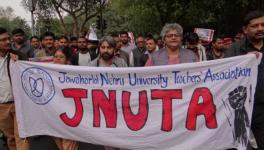‘Systematic Destruction of a Public University’: JNU Teachers Oppose Second Term for VC

Image Courtesy: Wikimedia Commons
Over a month after Professor M. Jagadesh Kumar was granted an extension as Jawaharlal Nehru University’s (JNUs) Vice-Chancellor (VC), the JNU teachers’ association (JNUTA) has voiced its resentment by demanding the appointment of a “regular” VC. The Union Ministry of Education had extended Kumar’s term in the backdrop a “delay” in the appointment process for a VC in January.
The association alleged that the Search Committee’s process for the appointment of new VC after the former had completed his five-years tenure on January 26 was “deliberately and conveniently” delayed. “The process of appointing a new VC began in October last year but what we hear is that the process has been delayed. It is not a sheer coincidence. We want to say that these delays are deliberate,” said Moushumi Basu, secretary, JNUTA.
In a press conference at the Press Club of India on Monday the teachers’ association alleged that several “arbitrarily” decisions had been taken by the VC over the last few years to weaken the existing “academic governance” system as a part of larger scheme to systematically dismantle JNU.
“We want to communicate that a further delay in the appointment will only aid to destroy further the unique character of the university that has consistently ranked first in the country even by the Government’s own estimates,” JNUTA alleged.
Notably, the opposition against Kumar is not new. Over the last five years over 150 cases have been filed against the incumbent VC by various groups including members of faculty, students and non-teaching staff. “In all these cases the university has been found to have committed illegalities,” Basu alleged in the press conference.
JNUTA touched upon various issues which they say has “bulldozed” the academic and research space the university is best known for and made it difficult for those from marginalised communities to sustain themselves. Among the major concerns raised by JNUTA included “arbitrary” appointments of chairpersons of Centres and Deans of Schools, the appointment of Selection Committee experts without informing Centres, changing of roster for reserved posts in faculty recruitment and the introduction of new programmes without prior deliberation with the faculty.
“The whole issue of appointments is under question. Despite the ongoing court cases the VC and his administration are installing experts of their own choice. People are being forced to turn to the courts,” said ex-JNUTA president D.K. Lobiyal.
OUTSOURCING OF ADMISSION TO NTA
Opposing the transfer of control for conducting examinations – from preparing question papers, to hosting and declaring examination results – to the National Testing Agency (NTA), the JNUTA alleged that the “changeover was done without intensive consultation with the faculty of Centres and Schools.”
In 2019, the responsibility to conduct entrance examinations was handed over to NTA, which, JNUTA alleged, was gradually given complete control to conduct examinations.
RTIs have revealed that there has been no Memorandum of Understanding signed between NTA and JNU for the years 2019-20, and 2020-21.
“In the RTI there was no information about the cost been incurred in the process. The question that arises is how can an institution go into an agreement with another autonomous body without an MOU?” the JNUTA asked.
Another concern raised by the JNUTA was about the change in the pattern of examinations, from an essay-type format to the multiple-choice based system of questioning and the inability of the students to write in their own regional languages. The teachers’ association said it had become difficult for them to assess the potential of students for research programmes through MCQs and that the opportunity to “gain access” to JNU by those who were not proficient in English was barred.
“We oppose this system and don’t want any third agency asking us. The shift from the earlier system to an MCQ-based online system was done in violation of procedures laid out in the statues of the university,” it said.
DISCONCERTING FINANCIAL ALLOCATION
The JNUTA alleged that since 2016 “significant changes” have been witnessed in the financial allocation with a sharp decrease in Plan grants from the UGC and Government of India along with a decline in expenditure on academic programmes that serve as the backbone of teaching and research in JNU.
Quoting reports the JNUTA mentioned that academic expenses had declined by 35.83% in the last three years – from Rs. 38.36 crore in 2017-2018 to Rs. 28.24 crore in 2018-2019 – and by another 30% to Rs 19.74 crore in 2019-2020.
“Ironically, a special allocation of Rs 30 lakh has been made to appoint lawyers and it must be noted that this is a large-scale wastage of public money,” it said.
ACADEMICS UNDER ATTACK
The JNUTA underlined that an unprecedented “attack” on JNU faculty has been unleashed by the VC. In 2018 show-cause notices were served to 48 faculty members for participating in a protest on campus. The VC’s administration has recently written to the entire faculty asking them to submit returns under CCS rules on immovable property owned by them with the threat to “debar the faculty members from participating in statutory bodies”.
“These are among the series of illegalities committed by the VC in the last five years to centralise power. The VC thinks he has the divine power to rule and he can do anything he wants,” JNUTA said.
Another grave concern raised by the teachers’ association was the “stopping of Pensions for Faculty post-retirement.” Recently, the Supreme Court had noted that salaries and pensions are “rightful entitlements” of government employees and in case of delay, they should be paid with interest.
JNUTA also registered its opposition against the recently-established engineering school on campus in a university known for research and academics. “Today India is overwhelmed with engineering colleges... The aim of opening one in JNU is an attempt to destroy the ranking of the university,” they alleged.
Get the latest reports & analysis with people's perspective on Protests, movements & deep analytical videos, discussions of the current affairs in your Telegram app. Subscribe to NewsClick's Telegram channel & get Real-Time updates on stories, as they get published on our website.
























